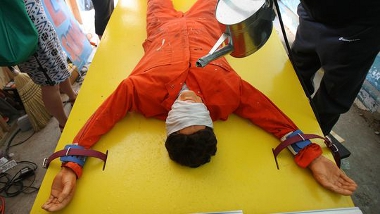Issue of criminalization of torture is much wider than it is seen by the Belarusian lawmaker
Comments on the National Report to the Universal Periodic Review (second cycle) prepared by the Ministry of Foreign Affairs of the Republic of Belarus. Issues that had previously been studied during the monitoring of places of detention, which was carried out by the HRC "Viasna" are touched upon in the report.
According to the authors of the Report (p. 173), the Criminal Procedure Code prohibits torture, cruel, inhuman or degrading treatment or punishment, medical or other experimentation without consent. This is not quite right: in accordance with Part 3 of Article 11 of the Criminal Procedure Code, no one involved in the criminal proceedings shall be subjected to violence or other cruel or degrading treatment, and without his consent to medical and other tests. Thus, the concept of torture is not described in this act.
The concept of torture has been introduced to the Criminal Code, but, in contrast to the legislation of other countries, no individual responsibility is provided for acts of torture.
For example, Article 127 of the Ukrainian Criminal Code provides for liability for torture, i.e. “the intentional infliction of severe physical pain or physical or mental suffering by beatings, torture or other acts of violence in order to induce the victim or another person to commit acts contrary to their will”.
The Criminal Code of Kazakhstan (Article 347-1) also criminalizes torture. Torture is “the intentional infliction of physical and mental suffering committed by an investigator, a person conducting an investigation, or any other official in order to obtain from the tortured or a third person information or a confession or punishing him for an act he or she has committed or is suspected of commission, or intimidating or coercing him or her or a third person, or for any reason based on discrimination of any kind.”
Article 166-1 of the Criminal Code of Moldova criminalizes the intentional infliction of pain or physical or mental suffering that amounted to inhuman or degrading treatment, which was committed by a public person or a person who actually performs the functions of a public institution or any other person acting in an official capacity, or with the consent or acquiescence of such persons, as well as torture, that is any intentional act of inflicting any person severe pain or physical or mental torment for the purpose of obtaining from him or a third person information or a confession, punishing him for an act committed by him or by a third person, or is suspected of having committed, intimidating or coercing him or a third person, or for any other reason based on discrimination of any kind, when such pain or suffering is inflicted by a public official or a person who actually performs the functions of a public institution or any other person acting in an official capacity or with the consent or acquiescence of said persons.
Thus, even a cursory analysis convinces us that the problem of criminalization of torture is much broader than it is seen by the Belarusian legislator, while no real measures to criminalize torture and cruel, inhuman, degrading treatment have been yet taken by the state.
The Belarusian Criminal Code punishes “torture or acts of violence committed in connection with racial, ethnic, ethnicity, religion and political beliefs of the civilian population” (Article 128 of the Criminal Code) and “forcing a suspect, victim or witness to testify or expert to present his conclusions by means of threats, blackmail or other unlawful acts committed by a person conducting the inquiry, preliminary investigation or administering justice”, including associated with violence or intimidation, as well as torture (Art. 394 of the CC).
Accordingly, for torture or atrocities committed on other grounds than those specified in Article 128 of the Criminal Code (e.g. in relation to a prisoner who defies requirements of the prison administration, in relation to patients in closed hospitals), or persons who are not listed in Art. 394 of the Criminal Code (e.g., employees of the internal affairs, which are officially not involved in inquiry or investigation, or some agent), there is no responsibility, or it may result in liability under the articles that do not correspond to the nature of the crime. This does not correspond to the spirit of international commitments undertaken by the Republic of Belarus; the wording of this part of the Report suggests that the problem under analysis is considered as a solved issue, and no further progress in this direction is expected in the sphere of legislation.
The Universal Periodic Review (UPR) is a mechanism of the UN Human Rights Council seeking to review the human rights situation in all countries of the world. Belarus passed the first cycle of the UPR in the UN Human Rights Council in 2010. Belarus accepted 74 out of the 94 received recommendations; in 2012 Belarus submitted to the Office of the UN High Commissioner for Human Rights an interim report on the implementation of the recommendations of the first cycle of the UPR. This report was analyzed in the framework of the monitoring of the situation of prisoners. In September 2014, Belarusian human rights activists sent to the Council their own materials for the UPR.


















